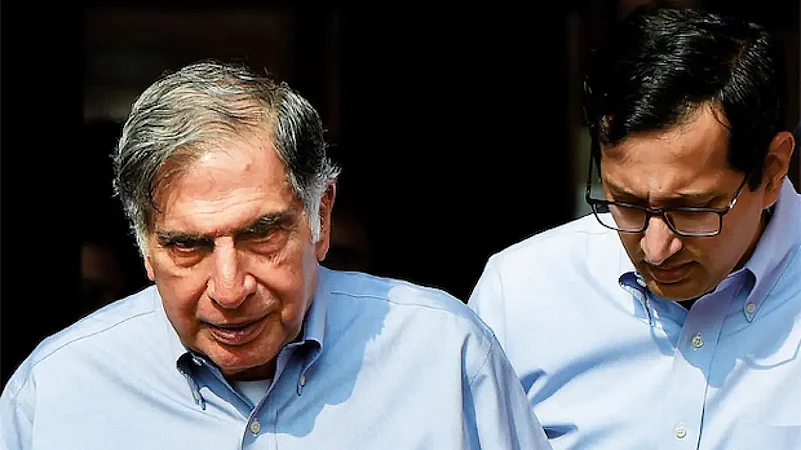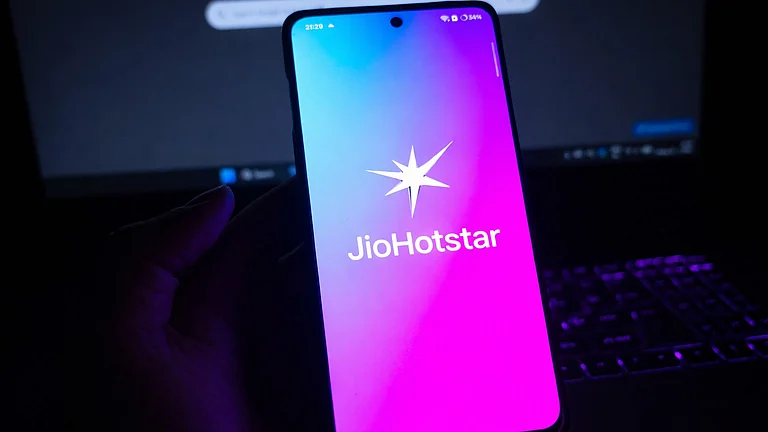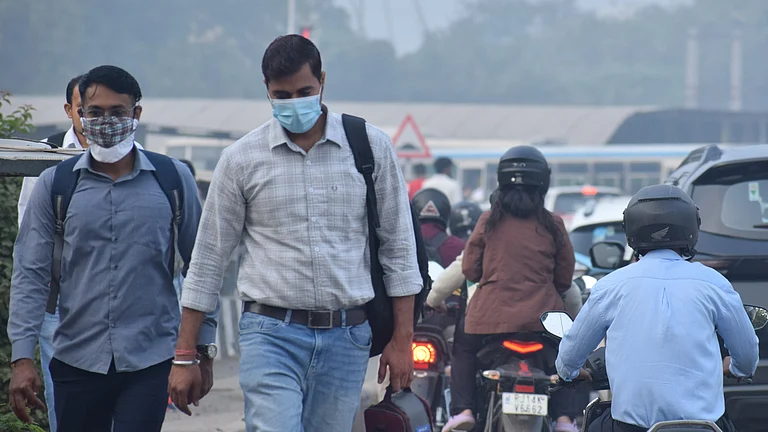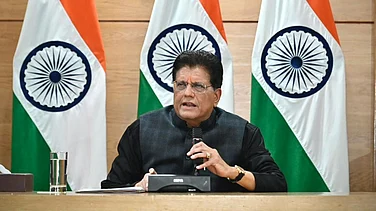12.30 AM. October 11, Mumbai International Airport. A CEO of a large Mumbai-based company was waiting, along with his wife, to take the British Airways flight to London, scheduled to depart at 0215. After aimlessly strolling through the duty-free shops, the couple had settled in the first class lounge; from his cushy chair, the CEO recalls seeing a very prominent face seated a couple of metres away. There was still nearly an hour left for boarding and first class passengers have the luxury of boarding much later; but two airline employees had already arrived to assist the gentleman to get to the boarding gate. “He seemed a little out of sorts and his shuffling gait was a trifle odd. I remember saying to my wife ‘I hope all is well with him,’” says the CEO. That gentleman was Ratan Tata. Barely a fortnight later, on October 24, when he heard that Cyrus Mistry had been replaced as the chairman of Tata Sons, the CEO says he was shocked. “What could have been the provocation for Tata to do this, while in such frail health? He just didn’t seem to be in any state to take on something of that sort by himself,” he says with incredulity.
The spotlight is on Ratan Tata, Cyrus Mistry and the venerable House of Tata — and its harsh glare is proving to be pretty unforgiving of the spots and blemishes on India’s most respected businessmen and business group. You can’t blame Mistry, though, for how ugly things are turning out to be. Like his family, this scion of the Shapoorji Pallonji group — one of India’s wealthiest families and the largest individual shareholder in Tata Sons — has been resolutely low-profile. In his four-year term at the helm of the Tata group, Mistry did not host a single press conference or appear in even one media interview. If the Mistry saga is making headlines now, it’s because he wasn’t even given the private opportunity to plead his case. “It is appalling that Mistry did not even get a chance to defend himself or go through the process of natural justice,” says Mohandas Pai, chairman of Manipal Global Education Services and former board member of Infosys. And, so far, Tata Sons has not given concrete reasons for Mistry’s abrupt impeachment. “This was nothing short of a palace coup,” says Pai.
That’s a particularly apt comparison. The Tata group is nothing short of an empire and those familiar with its history know that palace coups aren’t an unfamiliar occurrence at Bombay House. Indeed, every time a new king ascends the throne, tremors are felt through the court room. It was no different when JRD chose Ratan Tata as his successor. When the latter took over as Tata group chairman on March 25, 1991, critics were loud and unrestrained in their disapproval and skepticism. He was considered to have gained his position purely on the strength of his surname; he was incompetent, raged opponents both within and outside, and he didn’t possess an iota of the charisma of his predecessor.
But here’s the difference. JRD never came back or questioned his actions in the two years he lived after passing the baton to Ratan Tata. Perhaps he chose his successor with a greater degree of conviction and, having made the decision to step aside, was wise enough to recognise that if Ratan was to shape the future, he had to do it his way. Left to deal with the naysayers on his own, Ratan Tata fought vicious battles with the satraps and only emerged more powerful.
In contrast, Cyrus Mistry’s destiny at Tata Sons was probably scripted even before his appointment as chairman. Despite the brouhaha around the selection of Tata Sons chairman, which went on for nearly two years, in the end, when Mistry’s name was announced, he was widely perceived as the convenient choice. The Tatas and Mistrys have been connected for three generations and Shapoorji Pallonji have been silent partners in the group since 1930. Mistry had no prior experience in managing a large conglomerate, having managed his family business focused mainly on construction; yet, the long association and family history were seen as his biggest plus. Mistry had been a director on the board of Tata Sons since 2006 when his father Pallonji Mistry retired, and was already familiar with the group and Ratan Tata.
That comfort appears to have played a key role in his selection, especially as Ratan Tata was a reluctant retiree when he stepped down in 2012. Back in 2002, when Tata was to retire at 65, the Tata Sons board promptly re-designated him as non-executive chairman, which meant he could continue for another five years. Three years later, the board upped the retirement age of non-executive directors to 75. No doubt, Tata was a towering leader and could not be replaced easily just like most iconic leaders but, ultimately, he had to make way. Anil Singhvi, founder director, Institutional Investor Advisory Services, says, “Mr. Ratan Tata became a prisoner of his own conduct. There was no age limit for Tata executives when he took over the reins but he devised a retirement age to get rid of the satraps. And then it came back to haunt him,” says Singhvi.
When he had to finally step down, his best option was to choose a faithful insider of many years. The directors who were part of the selection process maintain even now that they were impressed with the presentation Mistry made on how he would model the group. But what clearly swung the vote in Mistry’s favour was Shapoorji Pallonji’s laissez-faire to l’affaire Bombay House, despite their 18.4% stake in Tata Sons. But clearly, Mistry did not stick to the script over the next four years. Not even after he was shown the door.
The shock and awe relating to Mistry’s ouster is not just because of the manner in which it has been handled but how a decision that was taken after two years of deliberation was overturned overnight. The reason for his involuntary exit is still a mystery —was he being punished for being a whistle-blower, was it a power struggle between the old and new ruler because of the predecessor’s inability to let go, or the handiwork of courtiers taking advantage of a gullible emperor and his relatively inexperienced heir? What everyone does know is what it wasn’t — it wasn’t about money (unlike many a corporate battle in the past) and it wasn’t a case of fraud. The issues that have come to light so far — unless there is some new shocker waiting in the wings — are not something a group of competent and well-meaning professionals, that is, the board members, could not have help resolve. Then, what gives?
On the record
In a nine-page letter splashed all across the media, Tata Sons delineated three main points for removing Mistry as its chairman. One, Mistry did not implement the plan that he had presented to the board prior to his appointment. Two, the deteriorating performance of group companies, mainly telecom, Indian operations of Tata Motors and overseas operations of Tata Steel, which made the group heavily reliant on its lone cash cow, TCS. There was hardly any divesture of assets to shore up revenues as had been suggested. And three, his “desire to seek control of group operating companies of the Tata group, to the exclusion of Tata Sons and other Tata representatives, as demonstrated in the case of Indian Hotels, where Mistry was the only Tata representative on the board of the company.”
Of the three, trying to take control could have been a serious issue, but the allegation in Indian Hotels seems flimsy. With a 38.7% stake in the company, Tata Sons could have easily pushed through its nominee directors, if it had wished to. For its part, Mistry’s camp refutes the allegation, pointing out that Tata Sons’ chief human resources officer NS Rajan was the other director on the Indian Hotels board, before his exit from the group after Mistry’s ouster.
If Mistry did try to untangle some of the group’s cross holdings, that was just to shore up the balance sheets. For instance, Tata Power had about 22% of its networth stuck in Tata Teleservices, at a time its core business required all available resources and then some. “Mistry freed up the capital, which was a dire need,” says an analyst tracking the power sector at a foreign brokerage.
It’s easy to see why that move would rattle those around Mistry. Historically, the group has been insecure about untangling holdings and freeing operating companies to independent boards. “In most Tata group companies the holdings were in single digits and all of them were shored up to over 26% through preferential allotments made to Tata Sons and other group companies. When institutional investors resisted this move in group company ACC and they could not go beyond 14.5%, they decided to sell the company to Ambuja Cements,” says Singhvi.
Then again, a Tata group insider elaborates that Mistry had suggested having a 15-member board with two vice-chairmen, who would each be on the boards of three group companies. Sans the designation, the two senior men — Ishaat Hussain and R Gopalakrishnan — sat on the boards of publicly listed companies, contest people close to Mistry. Besides, in most public listed companies, Tata Sons has more than 26% stake which means that it could push through its nominee directors anyway.
Also, as is evident, after his ouster, the board of Tata Sons, never belonged to Mistry. As for performance, it’s a question of whether you see the glass as half full or half empty. If Mistry has been discredited for the international operations of Tata Steel, the domestic operations of Tata Motors, and the financial drain under Tata Teleservices, the stellar performance of JLR or TCS that have done well have won him no accolades. It’s also worth noting that, notwithstanding the uneven performance, Tata Sons networth, after considering impairments, went up from Rs.31,192 crore in FY13 when he took over, to Rs.44,095 crore in FY16. Given this backdrop, what was the urgency to fire Mistry, five months before his term was due for review in March 2017?
It’s not as if Mistry inherited a perfect kingdom in 2012. Ratan Tata’s expensive acquisitions had taken the group to dizzy heights, but now it was reeling in the aftermath. Be it Tata Steel’s Corus or Indian Hotel’s Ritz Carlton, Tata Power’s mega power plant CGPL, or for that matter, the bleeding Nano project, there was enough red ink. Addressing these large problem areas would, obviously, mean tampering with Tata’s legacy. Given the Mistry family’s hands-off approach of the past eight decades, Cyrus may have seen no reason to question these past decisions — at least initially. But could he have really steered the group any other way without fixing the worst pain points in the biggest companies? He was caught in a cleft stick: keep the marquee acquisitions/projects afloat at whatever cost and bear the strain or ease the financial mess by letting go parts of the empire. Either decision would be equally unpopular.
That was not all. Mistry’s public representation attributes the impairments and write-downs at Tata Sons to certain other problematic investments, apart from the legacy issues, largely relating to TTSL. “There were also other investments of questionable nature such as Nagarjuna refineries (Rs.400 crore) and SASOL JV. One investment in Piaggio Aero, a company in the aerospace sector with a friend of Mr. Tata, was especially distressing. Tata Sons decided to exit the company at a commercial loss of Rs.1,150 crore. This was after the efforts of Mr. Bharat Vasani and Mr. Farokh Subedar who managed to recover Rs.1,500 crore, overcoming the objections of Mr. Ratan Tata who in contrast favoured increasing investments in that company. Today, the company is, for all practical purposes, nearly bankrupt,” alleges Mistry is his public representation.
Along the way, there was probably a philosophical difference too — Mistry’s vision for the group was perhaps different from Tata Sons. The Tata group official speaks of a defence ministry contract for infantry combat vehicles where two Tata group companies, Tata Motors and Tata Power, put in separate bids. “We would have expected them to join hands and bid for it together. Instead, Tata Motors collaborated with Bharat Forge for the project while Tata Power chose Titagarh Wagons as a partner,” says a group director. When the issue was brought up by the directors, Mistry did not have a convincing answer nor did he address the issue at the group level. Such differences in approach can be considered negative or positive, depending on where you’re sitting. While Tata might have looked at it as compromising on group synergies, Mistry probably believed in making companies accountable by allowing them the freedom. This is where the board could have made a difference, but it decided to take sides.
Meanwhile, the trust level between Mistry and Tata had hit an all-time low. A person close to Tata recalls that he was engrossed in his personal investments till 2014, and not too perturbed about what was going on at Bombay House. “But by 2015, he was continuously distracted, trying to understand operating company decisions in great detail and getting involved in specifics. It showed a lack of confidence in Mistry,” he says. This was the time many of the contentious decisions were coming up for action. Perhaps, this was what put Mistry on a sticky wicket.
During Tata’s tenure, he was not only the chairman of Tata Sons but also Tata Trusts, so there was no scope for conflict. At that time, the Tata Sons board was a cozy club that did not really indulge in much serious discussion or formal presentations, according to a former board member. When you have a towering leader such as Ratan Tata at the helm, perhaps that is only to be expected. “Mistry made a lot of effort to painstakingly present the strategy, only to sometimes put us to sleep,” says a director who voted Mistry out.
That’s where the problem lay. Mistry says governance issues stemmed from the abuse of the Articles of Association, which were changed after he took over as executive chairman, to ensure that certain decisions relating to operating companies of the group were mandatorily placed before the Tata Sons board where the trust-nominated directors had a veto power. Over time, Tata and NA Soonawala, a Tata loyalist and trustee on Tata Trusts, took the veto rights of the trust-nominated directors as their entitlement, to call for information, seek discussion, and control the decisions of the Tata Sons board. “Since many of the discussions relating to the operating companies were complex, Mistry had to himself go and explain these decisions to Tata or Soonawala, rendering the board of Tata Sons totally impotent,” says a person close to Mistry. He says Mistry had to go through nine meetings to take a final decision while bidding for spectrum for Tata Teleservices last year. “Apart from three meetings at Tata Teleservices, the subject had to be discussed three times with the directors of Tata Sons and three times personally with Ratan Tata,” he adds. “Even decisions that were signed and sealed, such as Tata Power’s Welspun deal were revisited by Soonawala.”
Up close and personal
There were more serious instances of governance lapses and trust issues that were coming to the fore. On September 15, 2016, at the Tata Sons board meeting, Mistry proposed initiating legal action against serial entrepreneur C Sivasankaran (Siva) to recover the money — he owed the group — to settle accounts with DoCoMo. The board members agreed and a decision was taken to initiate legal action. To Mistry’s bewilderment and dismay, 48 hours later, before any legal action was initiated, Tata Sons, Tata Teleservices and DoCoMo all received legal notices from Siva, alleging mismanagement of Tata Teleservices. Mistry’s internal mail questioning this uncanny coincidence — since the decision was privy only to board members of Tata Sons — was simply shrugged off.
On November 9, Moneylife carried a detailed account of l’affaire Siva. The story dates back to 2006 when he had invested Rs.884 crore in Tata Teleservices through a preferential allotment at Rs.17 a share. Just eight days later, Temasek was allotted shares at Rs.26, resulting in an instant gain of Rs.468 crore. Tata had defended this at the time, explaining that Siva was originally supposed to be allotted shares at par but in view of the investment from Temasek the price was raised. Curiously, Siva had paid Rs.650 crore through a loan from Standard Chartered Bank against a virtual guarantee by Tata Sons, which meant if Siva were to default, Tata Sons would have had to buy the Tata Teleservices shares and repay the loan. Besides this, he got an inter-corporate loan of Rs.132 crore from Kalimati Investments, a subsidiary of Tata Steel to fund his purchase. Again, in November 2008, when Japan’s DoCoMo bought 26% in the company, only 20% was in the form of new shares and the rest came from existing holders; Siva sold 40% of his holding at Rs.117.81 per share, making a hefty profit of over Rs.209 crore, that is, a return of 594% in less than three years.
The worst was yet to come. In April 2014, when DoCoMo exercised a put option in the contract, all those who had sold their shares to the Japanese telco had to pay up in the same proportion as they sold. Tata Sons deposited the entire amount of Rs.8,450 crore awarded to DoCoMo by way of international arbitration on behalf of all parties, including Siva. While all the Tata group companies paid up, Siva did not pay the Rs.694 crore due from him, which is what Mistry was trying to recover.
In response to the Moneylife story, the Tata group had defended its stance saying that the group company had handed the loan to Siva for only a few days at market-linked terms, and that the virtual guarantee to Standard Chartered was given to ensure that in the event of default on repayment of the loan, the shares of TTSL were not sold to a third party. Subsequently in 2008 when DoCoMo agreed to buy shares of TTSL, Tata Sons offered other shareholders of TTSL an opportunity for a pro-rata sale of their holdings subject to the shareholders agreeing to bear a pro-rata portion of any claims to DoCoMo should such a case arise.
Siva’s strong rapport with the Tata group has always been a subject of curiosity. The roots of this relationship go back to 2004 when Siva bought the Barista coffee chain from Tata Sons for Rs.65 crore. Just a month after that, VSNL, by then a Tata group company, acquired Siva’s Dishnet-DSL for Rs.270 crore.
At that time, Tata Teleservices’ rollout was in its early stages. TTSL was taking the CDMA route, which was the direct opposite of the more established GSM. This was critical since the Tata group had a 33% stake in Idea Cellular, a three-way joint venture with the AV Birla group and AT&T being the other shareholders. TTSL was caught in a bind and expansion was clearly a tricky issue.
Known to be a skillful negotiator, Siva got into Tata’s good books by offering to mediate on equipment purchase for TTSL’s expansion. A former Tata group executive recalls the initial set of meetings with Ericsson lasting for over two weeks with no progress being made. “Siva walked into the meeting room quite casually and asked the Ericsson team the price they were quoting. He worked out the arithmetic from scratch and brought it down to half in just that one meeting, which lasted less than 20 minutes. He was very brusque, saying Tata’s order was huge,” he says. That coupled with other equipment deals negotiated by Siva saved TTSL over Rs.1,000 crore in 2004 alone.
A couple of years later, as Tata and Birla were battling for control of Idea Cellular; Siva acquired the 1.7% stake that was held by AIG. Post the 2G scam though, Tata began distancing himself from Siva. “Once he realised the magnitude of the problem, Siva no longer enjoyed the confidence of Mr. Tata,” says the source. Perhaps not, but from the looks of it, Siva still has people in the Tata camp looking out for his interests.
It wasn’t just Siva. Over the past four years, Mistry seems to have stepped on the toes of several people close to Tata. Cyrus’s cousin Mehli Mistry, who was close to Tata, lost out on contracts from Tata Power after Cyrus introduced L1 (awarding contract to the lowest bidder), rather than handing out contracts on a discretionary basis.
A source who has worked closely with Tata says, “Mr. Tata has this knack of bringing in people from outside in key group positions who enjoy disproportionate influence over him. In the case of both Siva and Radia (Niira Radia, a lobbyist and public relations professional who handled the Tata Group account), they ended up holding disproportionate power. There were few people in the group who could call Mr. Tata by his first name; Radia was one of them.” There were a few others in this category, as is getting evident after Mistry’s ouster.
The palace coup
On 4 August 2015, the Shapoorji Pallonji group hosted an event at the Jamshed Bhabha theatre in south Mumbai to celebrate its 150th anniversary. The 1,000-plus guest list was an eclectic one, comprising family members, business associates, group employees and the most prominent CEOs in the city. Ratan Tata was a conspicuous absentee. Unavoidable overseas travel was the explanation given. One CEO decided to skip the post-event dinner and head to Thai Pavilion at the Taj Vivanta, a 20-minute drive away, for a family gathering. Seated in the restaurant was Ratan Tata, with an unidentified companion. “I was stumped — why would Ratan Tata skip such an important occasion of Shapoorji,” he wonders.
Exactly a year later, Indian Hotels unveiled Tajness, a new brand identity at its iconic property facing the Gateway of India. There was a reasonably large turnout in the hotel’s lobby, including Mistry and Tata. They were standing a few feet apart, mingling with the invitees. At this point, the photographers wanted the two of them to pose together. But when they called out, the younger man walked away without a word. The cold war had been on for a while, but this time it was evident in public. As the unfolding event proved, it was only a matter of time before Mistry would be shown the door.
It was not a big deal to oust Mistry. The board never belonged to Mistry anyway. At a Tata Sons board meeting on June 29, Harvard Business School dean, a confidante of Tata and board member, Nitin Nohria, and a fellow trustee-nominated director, Vijay Singh, excused themselves, returning after more than an hour. They were allegedly consulting Tata; at the time the board had tabled a discussion on Tata Power’s acquisition of Welspun Renewables. It’s one of the many things that perhaps rankled Mistry and he wanted to table a comprehensive governance report at the earliest. But neither the report nor Mistry would survive.
Nohria, who joined the board of Tata Sons in September 2013, has been a confidante of Ratan Tata for a while. In October 2010, just three months after he took over as the dean at Harvard, Tata Trusts gifted $50 million to the premier business school, for a new academic and residential building, to be called Tata Hall. The money came from Sir Dorabji Tata Trust, Tata Sons’ largest shareholder, and the Tata Education and Development Trust. Interestingly, Nohria’s brother-in-law, Amit Chandra (who is also the managing director of Bain Capital), is a trustee on the latter.
Sources say on August 8, Tata marked a mail to the directors of Tata Sons, nominating Piramal Enterprises chairman Ajay Piramal and TVS Motors chairman Venu Srinivasan to the board of Tata Sons. In due course, they were all inducted as directors. Mistry now claims that these independent directors did not go through the due nomination process. He adds in his representation that he was unsuspecting and did not object to the move. Significantly, Nohria has a strong association with Piramal; he has been serving on the board of Piramal Capital since September 2009. Ajay Piramal did not respond to text messages sent while Nitin Nohria and Amit Chandra refused to participate in this story.
On October 24, five minutes before the Tata Sons board meeting at Bombay House, Tata and Nohria came to Mistry’s room and told him that on that very morning, the trustees had taken a decision to replace Mistry ostensibly because Tata could not get along with him. Nohria allegedly told Mistry that since there was a communication breakdown between Mistry and Tata, they would like him to resign on his own accord or necessary action would be taken at the board meeting. It was not what Mistry expected on a day he had come all set to present a governance code for the three-tier group. Still in disbelief, Mistry’s reaction was curt: “You do what you would like to do. I will do what I would like to do.” In the board meeting that followed, he was voted out 6:2. “How can directors, who came two months ago, pass a verdict on his performance so quickly? The independent directors, obviously, did not conduct themselves ethically,” says Pai. “Also, communication breakdown with the principal shareholder cannot be a reason to oust a chairman. Afterall, the chairman is answerable only to the board, not shareholders.”
The firing of the chairman of Tata Sons naturally meant Mistry would step down from the boards of all Tata group companies, but he did not. Neither Tata nor his accomplices imagined Mistry would stay on and stubbornly fight his removal. It’s a lost battle for Mistry in the sense that even if he remains on the board of some companies it won’t really compensate for the humiliation he has been subject to. Nor does he gain anything meaningful staying on the board of the companies. But he has to remain relevant in order to protect his family’s holding in Tata Sons.
If Mistry persists on the boards, the extra-ordinary general meetings give him a chance to present his side of the story, especially the contentious issues relating to individual operating companies. With family ties at stake, allowing a Tata a free hand may have been acceptable but trusting generations of wealth to the hands of an unknown and untested entity isn’t. “His soft-spoken nature was construed as his weakness — he is a clear-headed man,” says a person close to him. Mistry has now raised the decibel on governance issues, which takes the argument to a completely new dimension because Tata Sons is actually governed by Tata Trusts, which is a public trust and not a private trust owned by Ratan Tata.
Matter of trust
Experts say there are serious issues of governance in public trusts trying to run listed companies. They are not subject to any scrutiny and the trustees cannot be held accountable. “It’s like assuming authority without accountability. Can a public trustee be subject to insider trading norms? Can minority shareholders sue them in a class action suit for violations?” asks Singhvi. Although there are eminent business people on the board of Tata Trusts, participating in corporate decisions is not exactly what public trusts are meant to do. “Public trustees are expected to focus on contributing money for public services not evaluating companies,” retorts Singhvi.
In this case, the sanctity of Tata Trusts is now coming into question, especially since the complexion of the trusts themselves is changing alongside the boardroom battle at Tata Sons. Those who have stood on the side of Tata have stayed on with the Trusts, while those who resisted have either resigned or are being eased out. Darius Khambata, a close friend of Mistry who resigned from Sir Dorabjee Tata Trust a day after Mistry’s ouster, was quickly replaced with Venu Srinivasan, the new non-executive director who voted out Mistry.
Personal equations are changing in the blink of an eye. For some old-timers, it’s unfathomable that someone like Nusli Wadia could have been ousted from the board of Tata companies. Wadia and Tata have been friends since childhood and the Wadia group chairman has the distinction of being the only person allowed to smoke in Bombay House. He does not sit on any of the trusts, but the other prominent business leaders who have opposed Mistry’s ouster now need to tread carefully.
A Tata insider claims that a board meeting of the trustees was held on the morning of 24 October, and barring Keki Dadiseth and one other, all trustees voted for the ouster of Mistry. A notable absentee was Nasser Munjee, a trustee of Sir Ratan Tata Trust who opposed the ouster of Mistry at the Tata Chemicals board meeting. The official stance for Mistry’s ouster so far has been that Tata Trusts relied on the dividend income of Tata Sons which was on a decline because of Mistry’s poor performance. Singhvi is unrestrained in his criticism on this stance: “If Tata Trust wants regular income, they should convert their shares over a period of time, into fixed deposits and government bonds to ensure regular income without any risks.” Both Munjee and Dadiseth refused to talk to Outlook Business for this story.
Tata is seen as powerful and dominant as he has ever been. Or is he, one wonders, given his age and health. That should be a cause for worry — not just for stakeholders of the Tata group but a generation of Indians who have held the Tata group in reverence. At 78, Tata has still not nominated his successor at Tata Trusts. When Mistry raised the point that he would like to be sure that he is comfortable with whoever takes over as chairman of the Trusts before joining the group, it only got a monosyllabic “okay” with no further discussion. This is where the presence of Venkataramanan Ramachandran is intriguing — and also critical.
“Venkat”, who was Ratan Tata’s executive assistant until his retirement, is the managing trustee of the Sir Dorabji Tata Trust, in addition to his responsibility for management and oversight of all Tata Trusts. Following Tata’s retirement in 2012, Venkat has been his confidante on several important issues relating to his private investments, among others. Today, Venkat — who came to the group through VSNL (now Tata Communications) — sits on the board of nine companies, including AirAsia (India), a joint venture with Tata Sons, RNT Capital Advisers and RNT Associates. He was earlier on the board of Infiniti Retail, which owns the Croma brand. In his letter to the Tata Sons board, Mistry has alleged that it was Venkat who was hiding fraudulent transactions in AirAsia India and also asked Tata Capital to give loans to Siva, which are said to have turned bad. Venkat did not respond to the e-mail request sent by Outlook Business.
A former group executive says Tata has been spiritually inclined for a while and Venkat, who acquired a business management degree from Sri Sathya Sai University, accompanied his boss to the meet the deceased godman some years ago. “In the current scenario, with his age, Mr. Tata’s dependence on Venkat is more than what he ever had on any of his executive assistants. He is hands-on in running the trusts but his role goes far beyond,” explains a person close to Tata.
This is not a situation Bombay House is familiar with. A chairman has been fired and there is an interim chairman who has come out of retirement. It is expected that a new chairman will assume charge over the next couple of months. The question is not about who will sit in the corner office but about how much Tata will shadow him.
Business historian and former IIMA professor, Dwijendra Tripathi thinks nothing that Tata has done in the past suggests that he could be so ruthless. “What makes Tata Sons action even more reprehensible is the fact that Mistry was not given a chance to explain his position,” he says. That also makes the issue of succession extremely tricky. “In view of what has happened to Mistry, I am not sure if any competent leader from outside will stick his neck out,” he says.
But this story is hardly about who will chair India’s largest conglomerate. Rather it is about how courtiers have engaged with an old kin. It is about control of the group through the venerable trusts, where succession has still not been spelt out. That could well be decided and dictated by the courtiers.
































